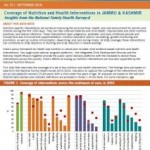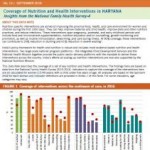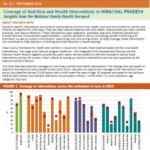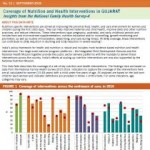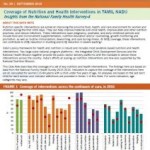It is crucial to understand the coverage of nutrition and health interventions to gain further insights into their effectiveness and impact. We present this Data Note that describes the coverage of a set of key nutrition and health interventions in Jammu & Kashmir, situated in the northern part of India. The findings here are based on data >> Read more Source: POSHAN: Partnerships and Opportunities to Strengthen and Harmonize Actions for Nutrition in India
Coverage of Nutrition and Health Interventions in HARYANA: Insights from the National Family Health Survey-4
It is crucial to understand the coverage of nutrition and health interventions to gain further insights into their effectiveness and impact. We present this Data Note that describes the coverage of a set of key nutrition and health interventions in the state of Haryana, situated in north western India. The findings here are based on data from >> Read more Source: POSHAN: Partnerships and Opportunities to Strengthen and Harmonize Actions for Nutrition in India
Coverage of Nutrition and Health Interventions in HIMACHAL PRADESH: Insights from the National Family Health Survey-4
It is crucial to understand the coverage of nutrition and health interventions to gain further insights into their effectiveness and impact. We present this Data Note that describes the coverage of a set of key nutrition and health interventions in Himachal Pradesh, a north Indian state, situated in the Himalayan mountain range. The findings here are based >> Read more Source: POSHAN: Partnerships and Opportunities to Strengthen and Harmonize Actions for Nutrition in India
Coverage of Nutrition and Health Interventions in in GUJARAT: Insights from the National Family Health Survey-4
In the recently concluded National Nutrition Month, nation-wide activities were organized under POSHAN Abhiyaan to address the nutritional challenges in India. We present this Data Note that describes the coverage of a set of key nutrition and health interventions in Gujarat, situated on the west coast of India. The findings here are based on data from the >> Read more Source: POSHAN: Partnerships and Opportunities to Strengthen and Harmonize Actions for Nutrition in India
Coverage of Nutrition and Health Interventions in in TAMIL NADU: Insights from the National Family Health Survey-4
In the recently concluded National Nutrition Month, nation-wide activities were organized under POSHAN Abhiyaan to address the nutritional challenges in India. We present this Data Note that describes the coverage of a set of key nutrition and health interventions in the southern Indian state of Tamil Nadu. The findings here are based on data from the National >> Read more Source: POSHAN: Partnerships and Opportunities to Strengthen and Harmonize Actions for Nutrition in India
- « Previous Page
- 1
- …
- 181
- 182
- 183
- 184
- 185
- …
- 200
- Next Page »
